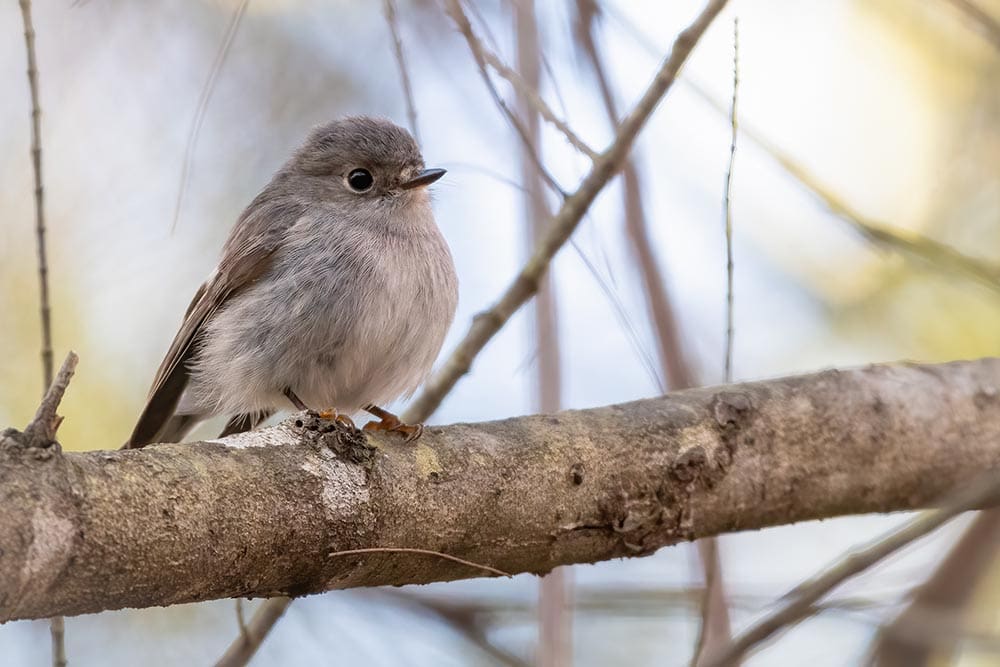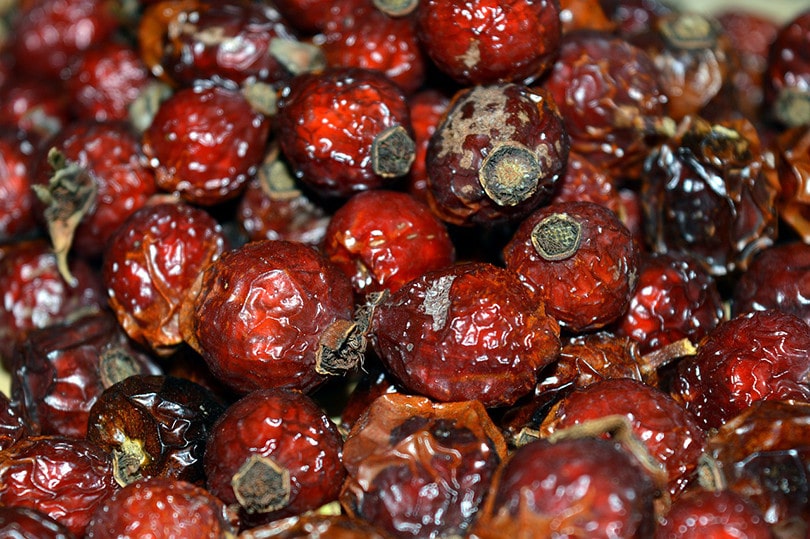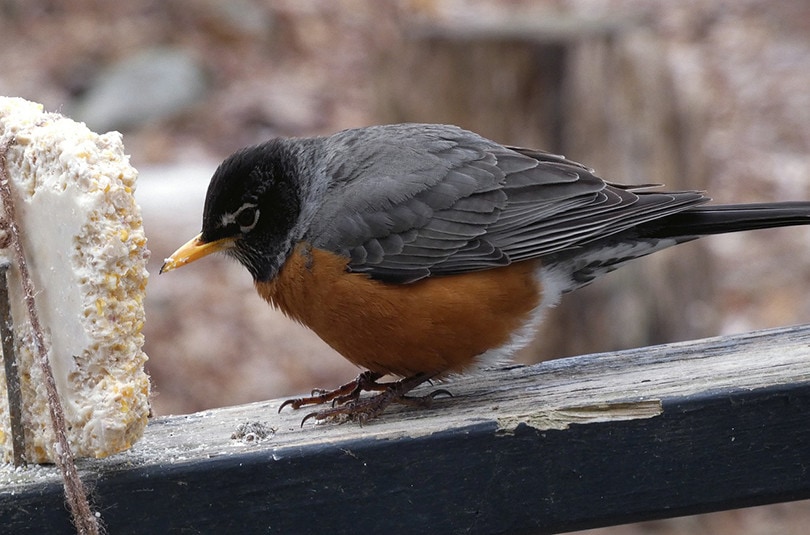What Do Robins Eat in the Winter? 9 Typical Foods
Last Updated on

One of the most common songbirds in the United States is the American robin, which is seen throughout North America. It is believed that the old adage “the early bird gets the worm” was based on the robin’s habit of rising early and catching worms. Not only that, but robins are one of the first birds to come back after winter. They have a lovely, cheerful song and are at home in urban, suburban, and wild areas.
You’ll even find robins as far north as the Alaskan wilderness! One question many bird lovers ask is what robins eat in the winter. Read on to discover more about the nine typical foods you can feed robins to help them stay healthy in the wintertime.

The 9 Typical Foods Robins Eat in Winter:
1. Berries and Small Fruits

During winter, robins eat as much wild and cultivated fruit as they can find. They typically eat small invertebrates also, but during winter, caterpillars, grasshoppers, and other invertebrates are very difficult, if not impossible, to find.
The berries and fruits robins most commonly eat in winter, not surprisingly, are easier to find than berries and fruits that usually grow in spring or summer. They include hackberries, hawthorn berries, high bush cranberries, and crabapples. If they have dried out on the plant, robins will also eat strawberries, raspberries, and sumac berries in winter.
2. Mealworms

Mealworms are a favorite of robins in the winter. As the larvae of a species of darkling beetle known as the mealworm beetle, mealworms are typically dried before being given to robins and other birds. You can purchase them live, and robins will eat them that way also.
Mealworms are highly nutritious with a lot of protein, fat, and fiber that can help robins make it through the long, cold winter. A large plate or bird feeder with a large base is the easiest method to serve mealworms. Also, some suet manufacturers place mealworms in their products. Bird experts recommend soaking the mealworms in water first to soften them.
3. Dried Berries

One of the robin’s favorite treats is berries, but in winter, there aren’t many species of berry available. If you want to give your local robins a treat and help them keep up their strength, dried berries are perfect!
Dried blueberries and cranberries are favorites, but both can be expensive. However, robins enjoy raisins, which are much more affordable. Robins will eat other dried fruit as well, including apples and cherries.
4. Suet

Suet, or technically suet cakes, are very attractive for robins in the winter. Suet is raw, hard fat found mostly on the kidneys and loins of cows. It’s very high in fat and thus excellent for providing robins with energy, something they desperately need in winter. Most suet made for birds will be mixed with seeds, oats, mealworms, cracked corn, peanuts, and other tasty treats that robins (and other birds) love.
5. Dry Bird Seed

If you want to give bird seed to robins in winter, the seeds must stay completely dry. Robins will eat various seeds, and a dry bird seed mix is perfect for them. However, if the seeds get wet, robins will stay far away from them. That’s because wet seeds will often sprout, and robins don’t eat sprouting seeds.
Also, harmful bacteria can arise from wet bird seeds, along with a strong, unpleasant odor. So, if you give bird seed to robins in your yard during winter, ensure it stays dry. If the bird seed gets wet, throw it away and replace it with dry seed.
6. Dry Oatmeal

Another nutritious treat you can give robins in winter is dry oatmeal, which is quite nutritious. It must, like bird seed, be dry as a bone. Wet or cooked oatmeal will stick to their beaks, and robins won’t touch it.
7. Cooked Vegetables

There are three vegetables that, when cooked, will delight the robins in your yard during winter. They include sweet corn, potatoes, and peas. Don’t try to give any raw veggies to robins because they won’t eat them. For some reason, they don’t like raw veggies, but they love fresh fruit!
8. Soft, Mild Cheese

Swiss, mozzarella, and other soft, mild cheeses are readily eaten by robins and have plenty of fat and protein. The best way to feed cheese to robins is to serve it coarsely grated on a plate or large, flat bird feeder.
9. Water

While it’s technically not food, it’s critical that you give robins potable water in winter, especially if the weather has been dry. Like all living creatures, robins need a fresh water supply to survive. If possible, you should also keep it from freezing. A heated bird bath will do the trick very nicely.
What Not To Feed Robins in Winter
Although they will eat a wide variety of foods, there are a few you shouldn’t give to robins since they are either risky or unhealthy. If you want only robins to visit your feeders, avoid the following foods: dried peas, beans, rice, lentils, wheat, and barley. Also, avoid giving robins bread. They will eat it, but it lacks the proper nutrition to help them through the winter. If they fill up on bread, they won’t have room for more nutritious food.
Final Thoughts
The robin’s first choice will always be a large bug, but they also love mealworms. Next comes fruits and seeds, although the seed must be dry. Dried fruits will bring robins to your yard, as will plain suet or suet mixed with mealworms, peanuts, seeds, etc. We hope today’s list of the nine typical foods robins eat in the winter helps you attract many of them to your yard next season!
Featured Image Credit: Alex Cooper Photography, Shutterstock
About the Author Greg Iacono
Greg Iacono is a self-taught writer and former chiropractor who, ironically, retired early due to back problems. He now spends his time writing scintillating content on a wide variety of subjects. Greg is also a well-known video script writer known for his ability to take a complex subject and make it accessible for the layperson.
Related Articles:
What Is the Best Binocular Magnification for Hunting? Optical Features Explained
10 Types of Hummingbirds in Arkansas (With Pictures)
8 Types of Hummingbirds in Nebraska (With Pictures)
5 Types of Hummingbirds in Idaho (With Pictures)
3 Types of Hummingbirds in Mississippi (With Pictures)
8 Types of Hummingbirds in Kansas (With Pictures)
5 Types of Hummingbirds in West Virginia (With Pictures)
5 Types of Hummingbirds in Ohio (With Pictures)
